Poll: Education
This Navigator Research report covers perceptions of the K-12 public school system, gaps Americans are seeing, and who is most trusted to improve it.
As children across the country head back to school, Americans offer a mixed picture of the state of public education in 2025. While Americans are broadly favorable toward public schools (67 percent favorable, including majorities across all parties), underneath this affection are concerns about quality, funding, and safety — as well as partisan divides about the direction of public education.
Despite holding favorable views of public schools, just a third (32 percent) of Americans say public schools nationally are doing an excellent or good job for kids. As is typical, Americans (and parents in particular) give their local schools a higher rating (46 percent excellent/good) suggesting that Americans’ experiences with local public schools are more positive than the national narrative about public schools. Half (50 percent) of parents give their local schools a positive rating, which rises to 60 percent among early grade parents.
Concerns About Health, Safety, and Quality
Both parents of students across grade level and non-parents express broad concerns about public education. These concerns focus on the health, safety, and wellbeing of kids at school, as well as the quality of instruction. Democrats are more likely to point to school resources than instructional quality.
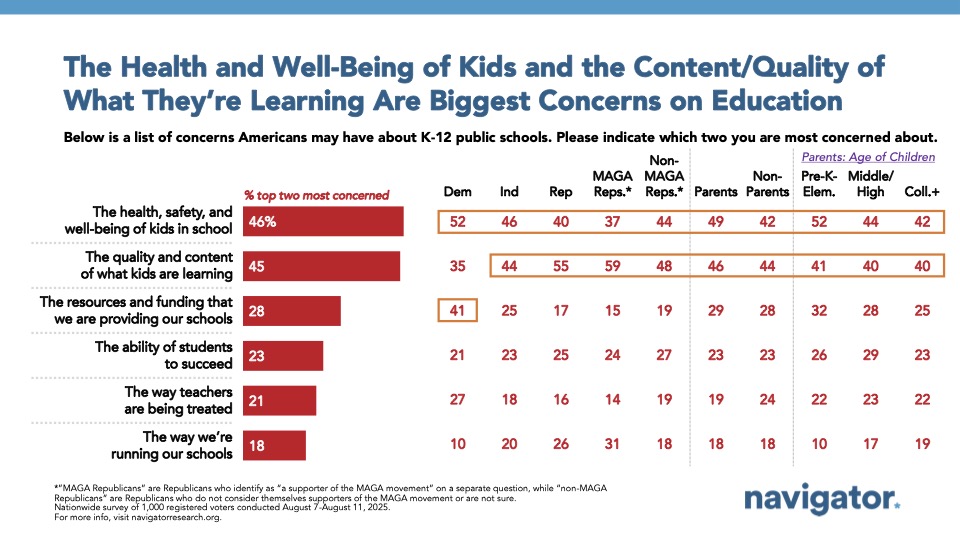
The threat of violence and school shootings also rises to the top of school concerns. 59 percent of Americans overall, including 61 percent of parents, say they are extremely concerned about school safety, including majorities across the political spectrum.
While majorities of Americans across partisanship point to student learning as a specific concern, this is a top concern for non-MAGA Republicans but just a second tier concern for Democrats. In an illustration of the ways in which public education has become increasingly partisan, the top issue among each group differs in telling ways:
- Democrats: School shootings
- Independents: Students not learning what they need to be successful
- Non-MAGA Republicans: Teachers imposing ideology
- MAGA-Republicans: Gender identity and sports
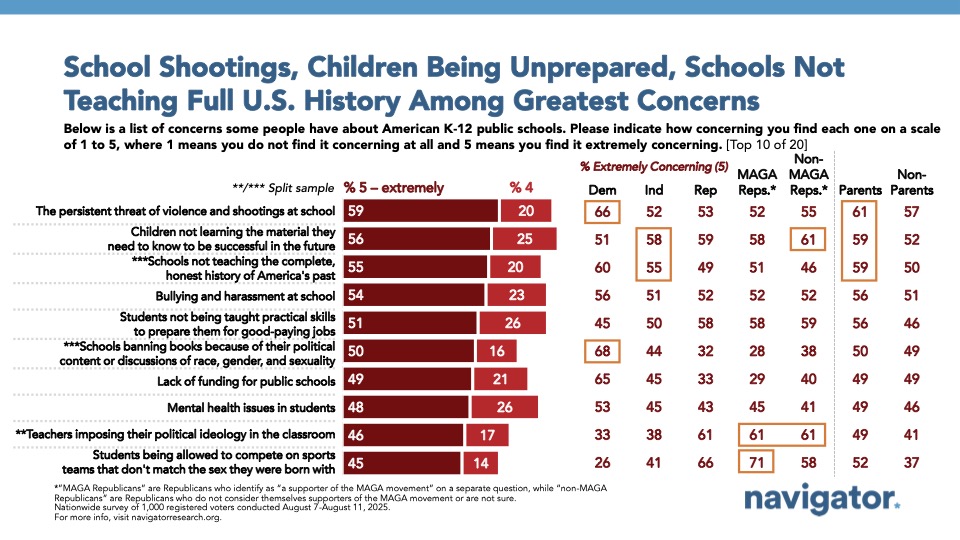
Republican Education Proposals
Recent education proposals from Republicans in Congress and the Trump Administration, including in the One Big Beautiful Bill, fare poorly. In alignment with Navigator’s July survey, this latest survey finds an overwhelming majority (85 percent) oppose taking away school lunches from students, including 72 percent who are strongly opposed. That is followed by threatening special education funding (60 percent strongly oppose), eliminating Head Start (58 percent strongly oppose), and cutting Pell Grants (55 percent strongly oppose).
When framed as “defunding public education and moving money to private schools instead,” 59 percent strongly oppose school vouchers, including 56 percent of independents and 37 percent of Republicans. In this framing, 66 percent of Black Americans and 63 percent of Hispanic respondents strongly oppose school vouchers. However, when asked about “creating a school voucher program to subsidize private school tuition,” just 28 percent of all Americans strongly oppose it, including 24 percent of independents and 15 percent of Republicans. In this framing, just 27 percent of African Americans and 26 percent of Hispanic respondents strongly oppose school vouchers.
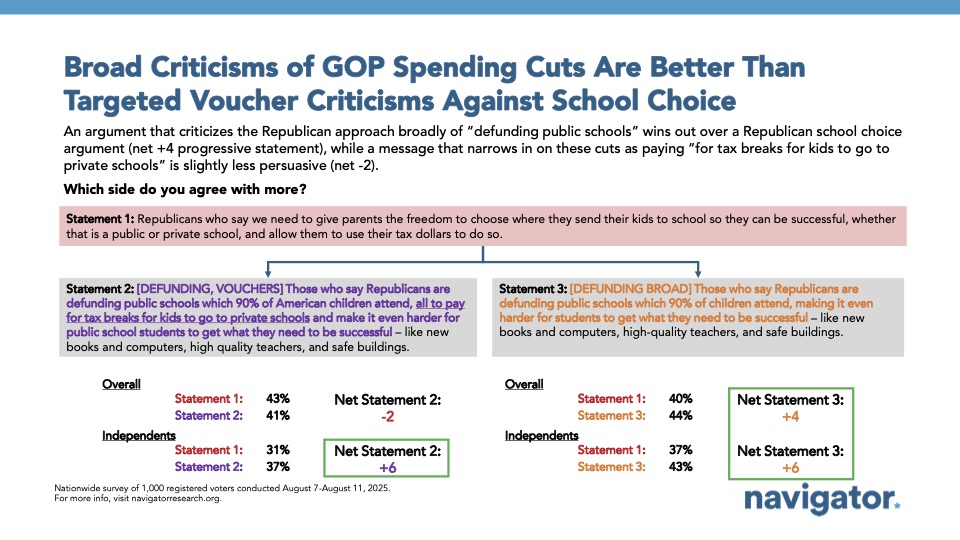
While Americans believe school children should be fed, regardless of framing, there is more power in saying “taking school lunches away from low-income kids” than “cutting kids from the free-reduced price school meal program.”
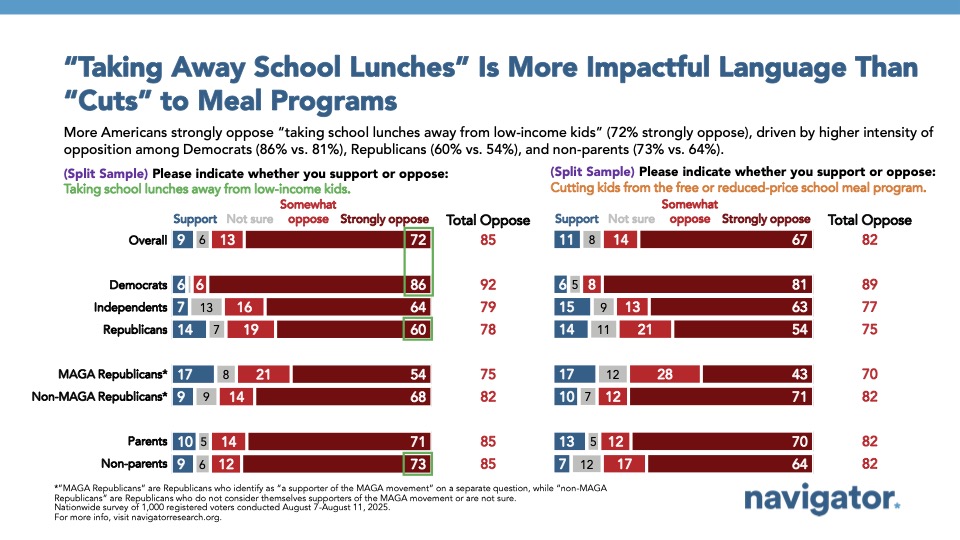
When it comes to the impact of cuts, Americans are most concerned about students losing access to school meals, students falling behind in reading and math, eliminating programs for students with disabilities, and kids not being prepared for the workforce. There are divisions across partisanship, but a majority — regardless of party identification — are concerned about the impact on students falling behind in school.
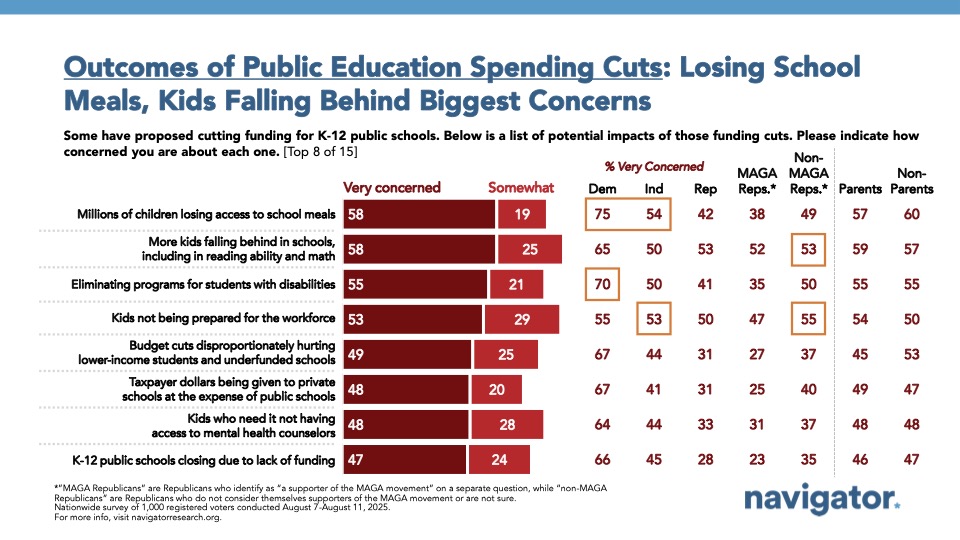
Messaging
In a head-to-head debate, public education advocates are better positioned by leading with an anti-status quo message that acknowledges that the public education system is broken. When advocates lead by acknowledging that the system is broken, they improve from +9 to +14 overall and from +2 to +18 among independents.
Conservative message: We should give states back control over their own public schools, increase vocational training, and make sure parents have school choice and a say over where their kids go to school and what they are taught.
Standard progressive message: What Republicans are doing on education isn’t working: we need to make sure students get what they need to be successful, and that means making sure schools have the resources to pay teachers a fair wage and to hire enough of them to prevent overfilled classrooms, to buy up-to-date textbooks, and to invest in science and math education.
Broken System progressive message: Our education system is broken, but what Republicans are doing on education isn’t working: we need to make sure students get what they need to be successful, and that means making sure schools have the resources to pay teachers a fair wage and to hire enough of them to prevent overfilled classrooms, to buy up-to-date textbooks, and to invest in science and math education.
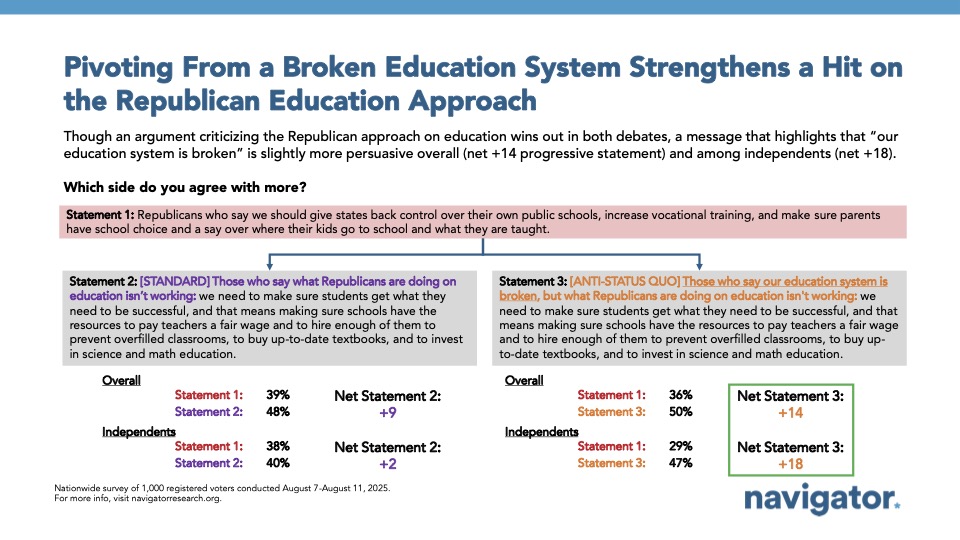
In a head-to-head debate on vouchers, public education advocates are better positioned by leading with a broad critique of cuts to education funding than a specific message about vouchers. When advocates use a “broader cuts” message, they improve from -2 to +4 overall. This can be bolstered by using the language highlighted above, which leans into concerns about cuts, describing vouchers as “defunding public education and moving money to private schools instead.”
Recommendations:
- Lead by acknowledging the public education system is broken. Americans don’t like Republicans’ solutions but they want a sharp departure from the status quo, which they do not believe is meeting the needs of America’s students.
- Americans are concerned about further cuts to education, but the impact of cuts is more important than cuts in general. Lead with the most dire impact: taking away school lunches from low-income kids.
- Americans are voucher-curious. Rather than messaging about vouchers specifically, talk about funding cuts and the impact of defunding public education.
